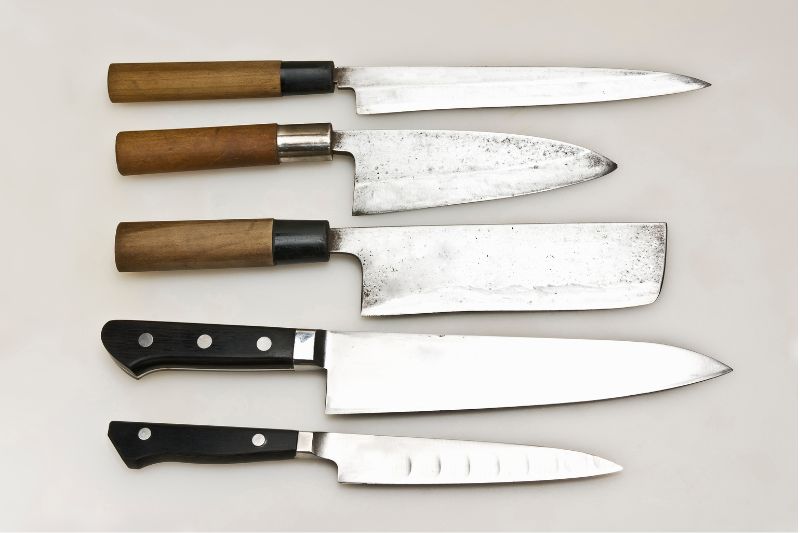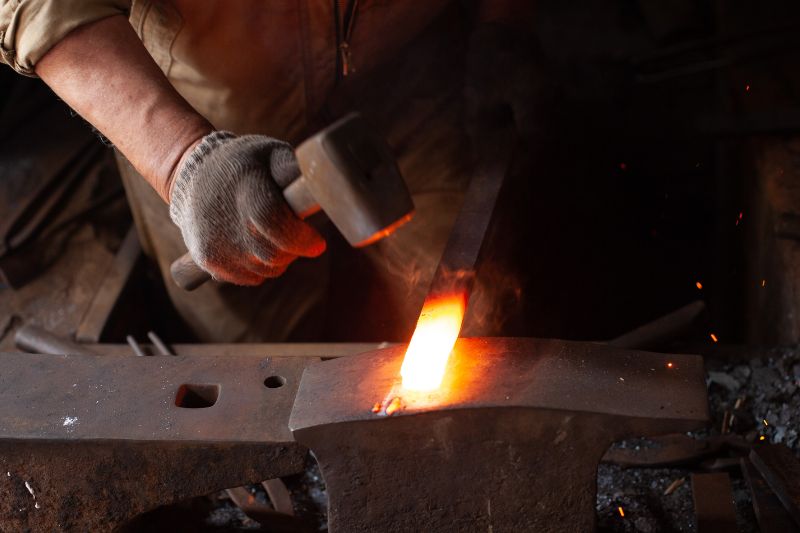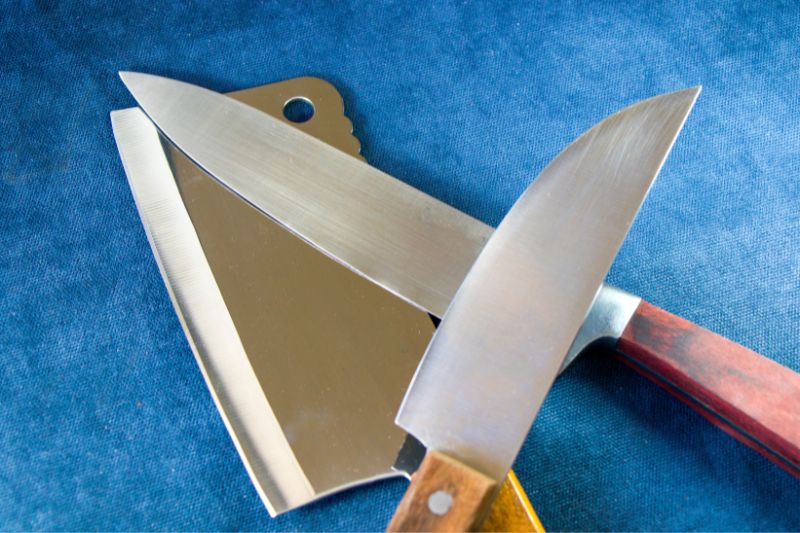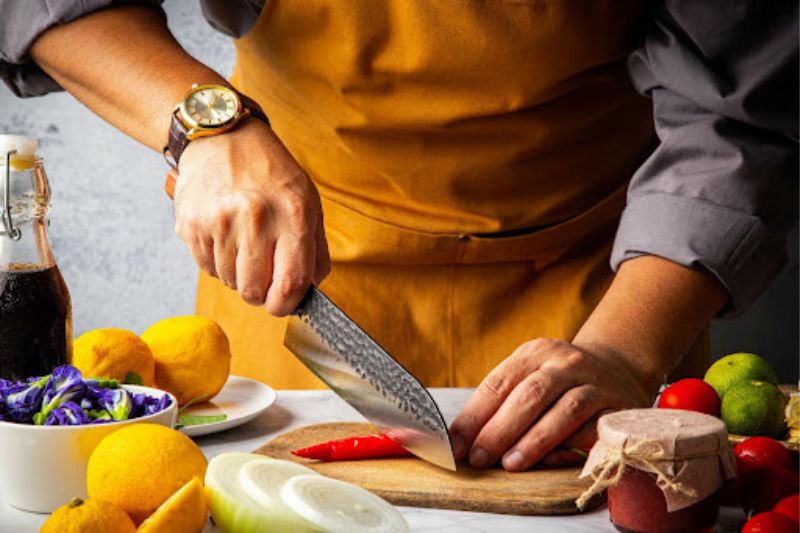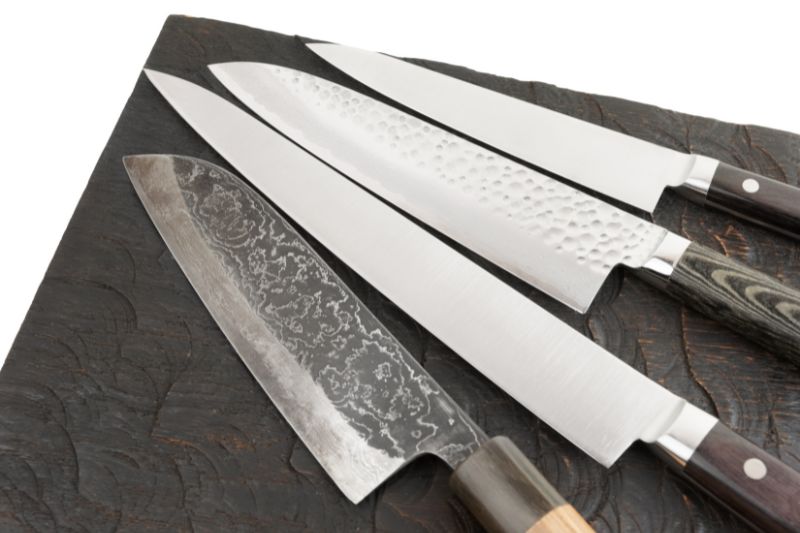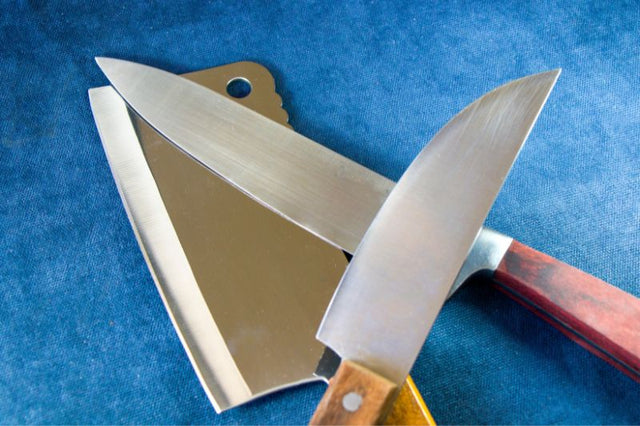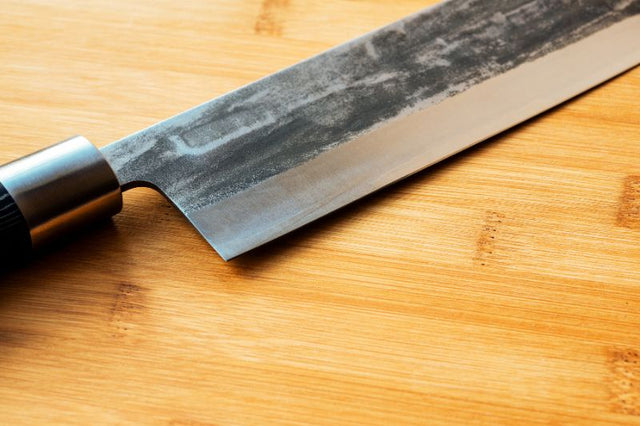Japanese knives are handy and, at the same time, aesthetically pleasing. These are some of Japan's main regions where handmade knives are produced. Each region has its own unique style and traditions, and the knives made in each region will reflect these differences. Handmade Japanese knives are prized for their exceptional quality, craftsmanship, and attention to detail, and they are highly sought after by professional chefs and home cooks alike.
Handmade Japanese knives and mass-produced knives can differ in several ways, including:
1. Material
Handmade knives are often made from high-quality, high-carbon steel, which is harder and holds a sharper edge than the steel used in mass-produced knives. Japanese knives often use a type of steel called "hagane," a tough steel used for the blade's cutting edge, while a softer steel called "jigane" is used for the blade's spine and tang to provide flexibility.
2. Craftsmanship
Handmade knives are created by skilled blacksmiths and knife makers who have honed their craft over many years. These knives are made with attention to detail, including precise heat treatment, forging, and grinding to ensure a sharp, durable blade. Mass-produced knives are often made by machine, with less attention to detail and no individual craftsmanship.
3. Design
Handmade knives are often one-of-a-kind, with unique designs that reflect the style and skill of the maker. Mass-produced knives, on the other hand, are designed to be efficient and economical, often using standardized designs.
4. Performance
Because of the materials and craftsmanship used, handmade knives tend to perform better than mass-produced knives, with sharper, more durable blades and better balance. They are also often easier to sharpen and maintain since they are made with care and precision.
What are the differences between hand-forged Japanese knives and machine-forged knives?
Hand-forged Japanese knives and machine-forged knives differ in the methods used to create the knives and the resulting quality and characteristics of the knives.
1. Method of production
Hand-forged Japanese knives are made using traditional blacksmithing techniques, where the knife maker heats the steel and then hammers it into shape. This blacksmith process is repeated multiple times to create the desired shape and hardness. On the other hand, machine-forged knives are produced using modern machinery and techniques, where the steel is shaped using specialized machines that can make many knives at once with consistent dimensions.
2. Attention to detail
Hand-forged knives are made by skilled craftsmen who put a great deal of attention into each knife, paying close attention to details such as the balance, weight, and sharpness of the blade. On the other hand, machine-forged knives are often made on an assembly line and may receive a different level of individual attention and care.
3. Quality of materials
Hand-forged knives are often made with higher-quality, high-carbon steel that is carefully selected for its hardness, durability, and ability to hold an edge. Machine-forged knives may be made with lower-quality steel or other materials and may have a different level of quality control in terms of the materials used.
4. Unique qualities
Hand-forged knives often have unique attributes, such as variations in the steel pattern or handle, that reflect the skill and style of the knife maker. Machine-forged knives tend to be more uniform in their appearance and characteristics.
In general, hand-forged Japanese knives are considered to be of a higher quality and to have a better performance than machine-forged knives, but they are also typically more expensive. Hand-forged knives offer a level of individuality, quality, and craftsmanship that is difficult to find in machine-forged knives.
Where do they make handmade knives in Japan?
Handmade knives produced in Japan are made in various locations throughout the country, but some of the most famous knife-making regions are:
1. Sakai
Sakai is a city in Osaka Prefecture with a long history of knife-making and is considered one of Japan's top knife-making regions. Many of the best Japanese knife makers, including Shigefusa and Kasumi, are based in Sakai.
2. Takefu
Takefu is a city located in Fukui Prefecture that is known for its high-quality knife production. Takefu is home to many of Japan's top knife makers, and the city is renowned for its traditional knife-making techniques and high-quality materials.
3. Tosa
Tosa is a region located on the island of Shikoku that is known for its handmade knife production. Tosa is home to many skilled craftsmen who use traditional techniques to create high-quality knives that both professional chefs and home cooks prize.
4. Seki
Seki is a city in Gifu Prefecture that is known for its production of high-quality swords and knives. Seki has a long history of knife making, and the city is home to many of Japan's top knife makers, including Global and Misono.
If you're looking for handmade knives in Japan, here are some places you can check:
1. Knife Shops
Many knife shops in Japan specialize in handmade knives. These shops are typically located in cities and towns known for their knife-making traditions, such as Sakai, Takefu, and Tosa.
2. Knife Markets
Some cities and towns in Japan have knife markets where you can find various handmade knives. These markets are usually held once a month and are a great place to see a wide range of Japanese knives and meet the makers in person.
You can also find handmade Japanese knives online from retailers specializing in Japanese knives like us (Japanese Knife Co.). These retailers often have a wide selection of knives to choose from and can help you find the perfect knife for your needs. Click here to buy quality handmade knives online
4. Directly from the Maker
You can also find handmade knives directly from the maker by visiting their workshops or studios. This is a great way to see the knife-making process firsthand and learn about the maker's techniques and materials.
These are some places where you can find handmade knives in Japan. By visiting these places, you can see the wide variety of handmade Japanese knives available and choose the best suited to your needs.
Are Japanese handmade knives more expensive than manufactured ones?
Yes, Japanese handmade knives are more expensive than manufactured knives. There are several reasons for this:
1. Materials
Handmade Japanese knives are often made with higher quality materials, such as high-carbon steel, than manufactured knives, which can increase the cost.
2. Craftsmanship
The process of making a handmade Japanese knife is much more labor-intensive than the process of making a manufactured knife. Skilled artisans spend significant time creating each knife, contributing to the higher cost.
3. Reputation
Japanese handmade knives have a reputation for being some of the finest knives in the world, and this reputation contributes to their higher cost. The prestige associated with owning a handmade Japanese knife is also a factor that drives up the price.
While handmade Japanese knives are typically more expensive than manufactured ones, the added cost is often due to the knives' higher quality materials, craftsmanship, and reputation. However, the price of a handmade Japanese knife can vary widely depending on the maker, the materials, and the complexity of the design.
Are Japanese handmade knives better than machine-made knives?
Whether a Japanese handmade knife is better than an industrial knife depends on various factors, such as the knife's purpose, the materials used, and personal preferences. Here are some factors to consider:
1. Quality
Japanese handmade knives are known for their exceptional quality and attention to detail. They are made by skilled craftsmen who use traditional techniques and high-quality materials to create knives that are durable, sharp, and precise. On the other hand, industrial knives are typically mass-produced and may have a different level of craftsmanship or attention to detail than handmade knives.
2 .Performance
Japanese handmade knives are designed to perform well for various tasks, and their high-quality construction and precise cutting edges make them well-suited for jobs such as chopping, slicing, and dicing. Industrial knives may also perform well, but they may have a different level of precision or sharpness than handmade knives.
3. Personal Preferences
Ultimately, the choice between a handmade Japanese knife and an industrial knife comes down to personal preferences. Some people prefer the traditional look and feel of handmade knives, while others prefer the convenience and affordability of industrial knives.
In conclusion, whether a Japanese handmade knife is better than an industrial knife is a matter of personal preference. A handmade Japanese knife may be the better choice if you want exceptional quality, craftsmanship, and performance. However, if you're looking for a more affordable and convenient option, an industrial knife may be a better fit.
Get Free Bonus Books

Sign up for free to the Japanese Knife Club to get advice and exclusive articles about how to choose Japanese Knives, and tips and tricks for using Japanese knives.
About the author
Kei Nishida
Author, CEO Dream of Japan
Certification: PMP, BS in Computer Science
Education: Western Washington University
Kei Nishida is a passionate advocate of Japanese craftsmanship, a writer, and the founder and CEO of Japanese Knife Co., Japanese Green Tea Co., and Japanese Coffee Co., all part of Dream of Japan.
His journey began with a mission to introduce the world to the exquisite flavors of Japanese green tea. Through Japanese Green Tea Co., he pioneered the import of premium tea grown in nutrient-rich sugarcane soil, earning multiple Global Tea Champion awards. He then expanded into the world of coffee, launching Japanese Coffee Co., the first company to bring Sumiyaki charcoal-roasted coffee to a global audience.
With a deep appreciation for Japanese artistry and tradition, Kei turned his attention to one of Japan’s most revered crafts: bladesmithing. Through Japanese Knife Co., he made handcrafted katana-style knives, created by a renowned katana maker, available outside Japan for the first time. These exceptional knives embody centuries of samurai sword-making expertise, blending tradition with modern functionality for chefs and collectors alike.
Kei’s journey continues as he uncovers and shares Japan’s hidden treasures—one sip, one blade, and one legacy at a time.

